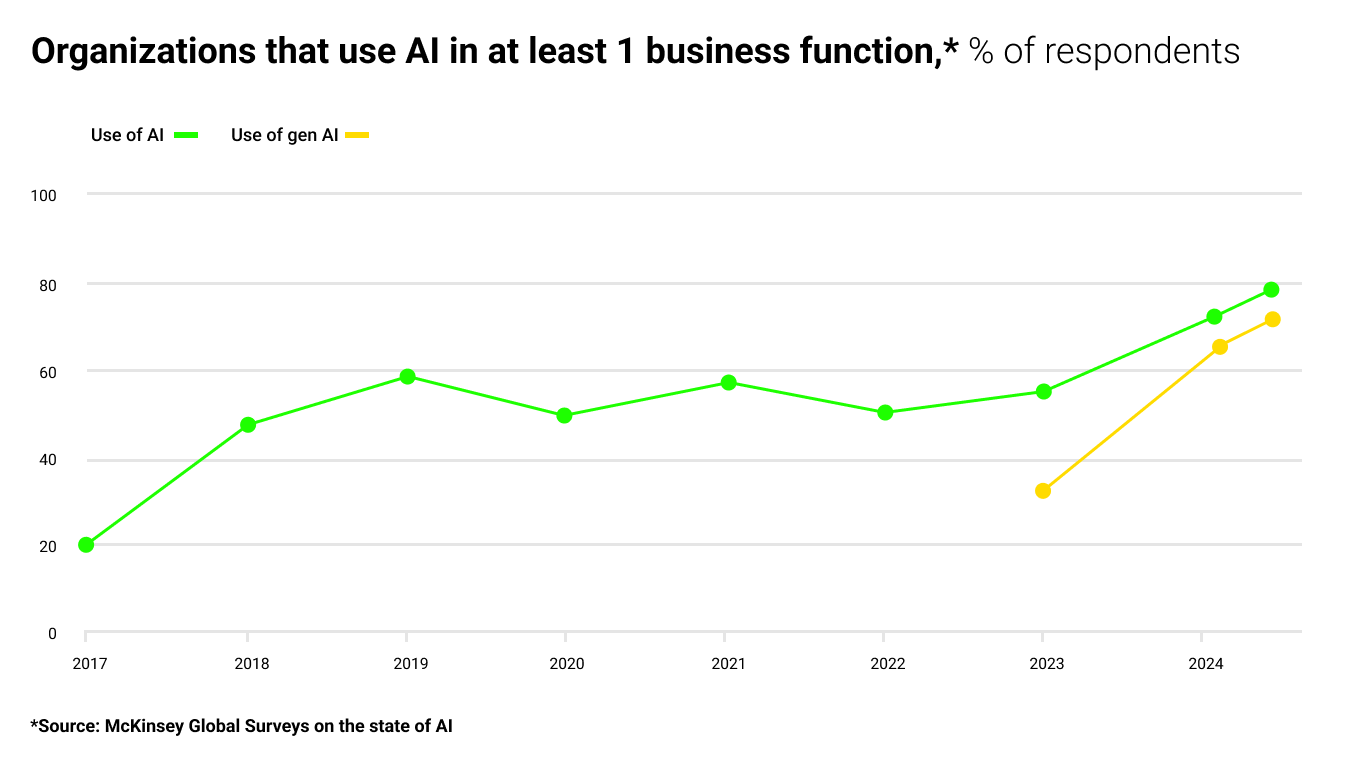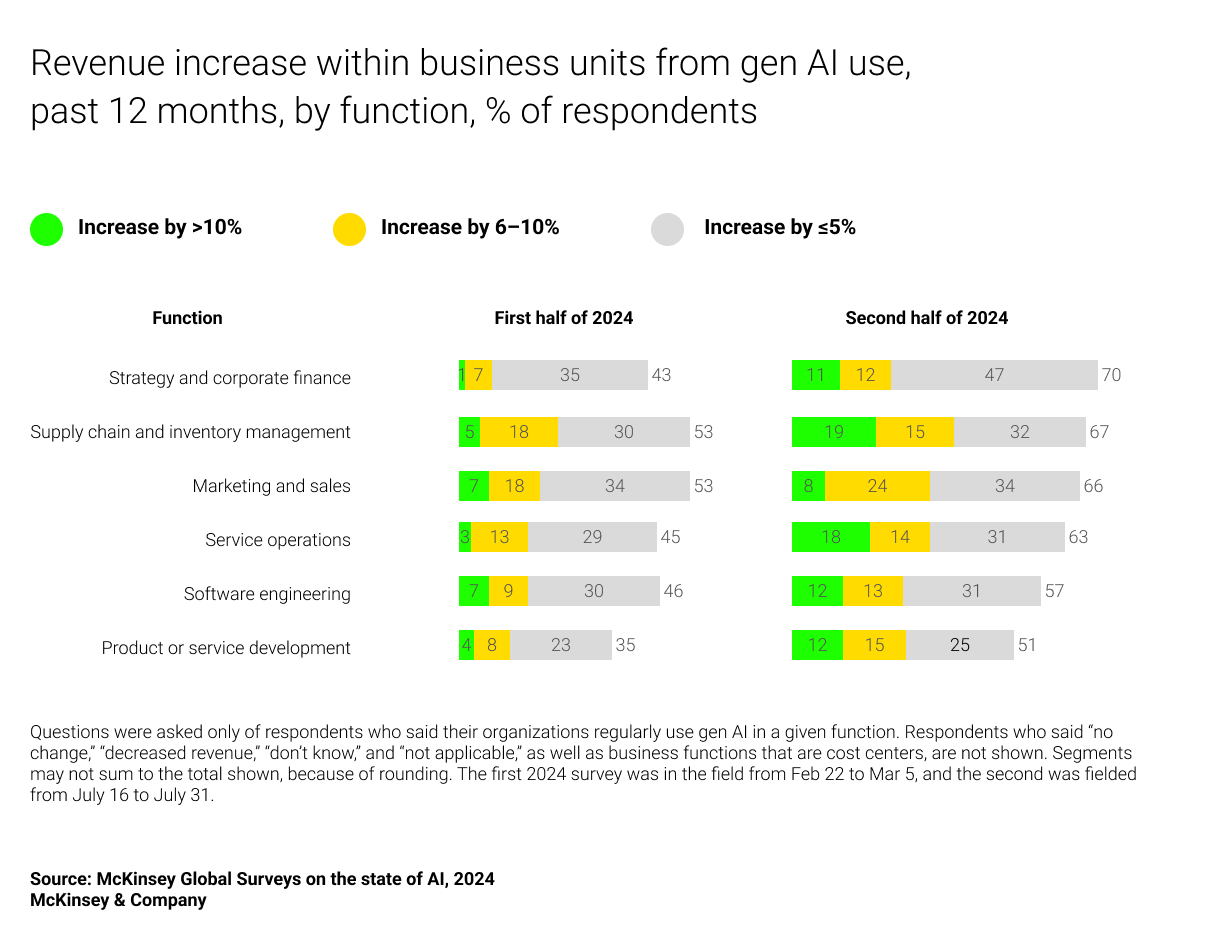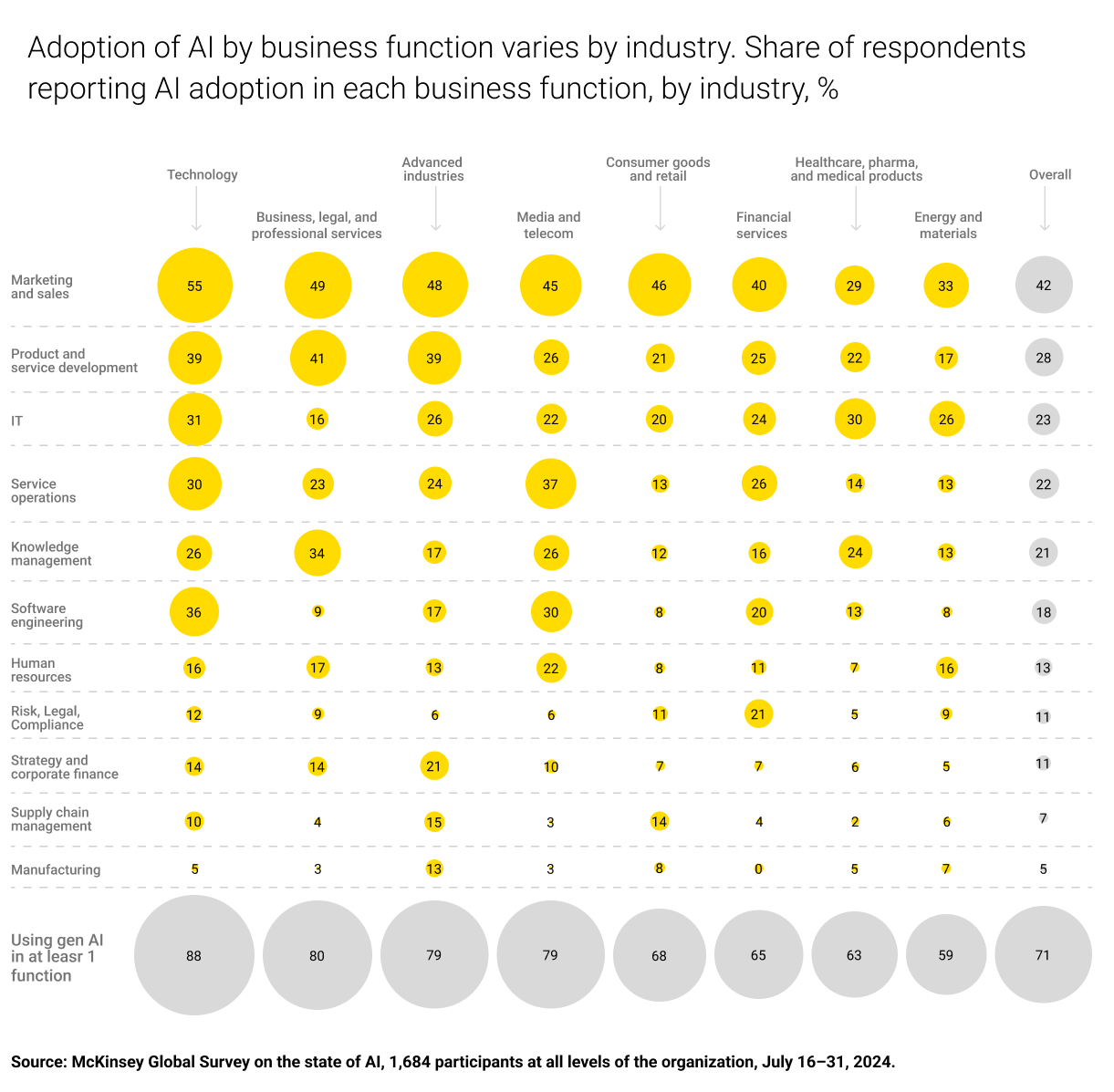- Understanding AI: more than just smart machines
- Generative AI for business growth
- Smart technology as a competitive factor
- The importance of a well-defined AI strategy for business
- Building an AI business strategy
- Step 1: Identify the right processes
- Step 2: Start small for maximum impact
- Step 3: Seek professional AI consultation
- Andersen’s expertise: how we support our clients in AI initiatives
- Success stories: Andersen's use cases
- Recruiter.AI
- Smart document assistant
- Innovative computer vision projects
- Intelligent facility management
- Conclusion
The impact of artificial intelligence goes far beyond the tech industry. Companies worldwide are aligning AI with business strategies to enhance operations and secure stable and long-term growth.
In this article, Andersen’s experts in AI development explore the opportunities this technology offers for large enterprises, SMEs, and startups, with a focus on real-world AI implementation strategies.
Understanding AI: more than just smart machines
To keep up with all the current advancements, you need to have an AI business strategy. Naturally, it should correspond to your business objectives.
But to reap the benefits, you need to understand the essence of AI first. In a nutshell: it enables machines to perform tasks instead of humans. These can be both tedious/repetitive (and the level of precision here is already stunning) and creative ones (in this respect, AI hasn’t yet surpassed human intelligence, though).
The following subfields of AI are essential:
- Machine learning is the foundation. Smart algorithms have access to massive datasets and analyze information. By identifying patterns, they can recognize certain images, understand speech, and so on. AI in a business strategy often begins at this stage: a company can use ML for just about anything, from getting forecasts to automating critical processes.
- Deep learning takes it a step further. With it, machines can tackle complex tasks, such as lightning-fast facial recognition or real-time translation during video calls.
- Natural language processing is an important feature of state-of-the-art devices. So, we can talk to our phones, for instance, when chatting with virtual assistants. They not only understand what we say—every year, they are getting better at grasping what we mean. Of course, in certain contexts they still have limitations.
- Computer vision enables AI to interpret and process visual data. It can be applied in many industries. For example, manufacturers can easily spot defects, while autonomous vehicles can safely navigate in low light.
The current capacities of artificial intelligence are already impressive. And it’s beyond any doubt that they will keep evolving.
Generative AI for business growth
GenAI deserves a special section in our article. Currently, it’s one of the most impressive applications of AI.
As part of a broader AI strategy for business, GenAI helps people create new content—texts, images, or even music and videos. It mimics human thought processes with high precision and relies on language models trained on vast amounts of data. It’s used to develop personalized marketing content, automate customer interactions, improve customer experience, and enhance product innovation.

With the rise of ChatGPT and DALL·E, it has become widely accessible. So, when lay users enjoy generated content, why wouldn’t businesses? GenAI helps professionals generate emails, write social media posts, create stunning visuals, develop product variations, and much more. That’s why modern AI implementation strategies typically include GenAI for greater efficiency.
Smart technology as a competitive factor
According to Statista, the AI market is expected to reach a volume of $1.01 trillion by 2031, with an annual growth rate of 26.60% (2025–2031). This growth is easy to explain. Companies leveraging AI for business strategies are already seeing the benefits of a smarter and more efficient approach to operations.
Three key advantages make AI applications indispensable:
- First, a new level of efficiency. Analyzing data used to take much time when humans performed such operations. With the right AI implementation strategy, a firm gets analytics tools that can carry out these tasks in seconds. Thanks to this, professionals can be more efficient in building their strategies, work faster, and offer their clients impeccable services.
- Second, smart cost control. It’s obvious: by automating workflows, predicting potential errors or detecting existing ones at earlier stages, one can greatly cut costs.
- Third, innovation as the new standard. Thanks to intelligent technology, companies can introduce new business models or craft products that are in demand.
The message is clear: companies investing in smart technology today are setting new industry standards.
The importance of a well-defined AI strategy for business
For SMEs, AI provides the competitive advantage needed to keep up with larger players. Meanwhile, big enterprises leverage intelligent technology to further strengthen their market leadership.

Naturally, any business striving to use this technology most efficiently should have a clear artificial intelligence strategy. It will help specialists solve existing problems and recognize new opportunities. They should identify the projects that could benefit from AI support and provide a clear roadmap for execution.
Just a couple of examples of AI systems one might develop:
- Smart CRM systems analyze customer behavior in real time, anticipate needs, and suggest optimal actions.
- Precision marketing tools create tailored campaigns that fully meet the needs of customers.
- 24/7 customer service, with pioneering systems that handle standard inquiries autonomously. These operate quickly, accurately, and around the clock.
A company with a thought-out strategy gets important insights (artificial intelligence extracts them from huge datasets), improves production cycles, and builds more loyal customer relationships. The latter is possible thanks to highly personalized offerings that also come with the adoption of AI.
When crafting an AI strategy for business, you should define KPIs to measure your future success. Also, you need to make sure you have the right experts and infrastructure to secure impeccable AI strategy development and address any ethical considerations that might arise.

Building an AI business strategy
So, where do you start? These three proven steps will help you get going:
Step 1: Identify the right processes
This step lays the foundation for a well-crafted AI strategy for business. Take a close look at your company’s processes, perhaps you’re wasting valuable time on certain routine tasks. They could be easily performed by machines. This is where AI holds the greatest potential, whether it’s data processing, scheduling, or supply chain management.
Analyze your processes thoroughly—and you will reveal where smart tools can deliver the highest ROI.
Step 2: Start small for maximum impact
A full-scale transformation overnight isn’t realistic. However, small strategic steps can be highly effective.
Begin with a manageable pilot project—such as a chatbot for customer service or an intelligent email-sorting tool. This way, you will build confidence in the new technology and get quick wins. As part of your AI implementation strategy, these initial steps will help integrate AI smoothly into your existing processes.
Step 3: Seek professional AI consultation
AI development requires deep expertise, but not every company has it, especially SMEs. That’s why you should collaborate with professionals who offer AI consulting services, fully understand your business goals, and can recommend the right approach.
A reliable IT agency will help you select or develop appropriate tools and integrate them seamlessly into your existing systems. This not only reduces costs but also speeds up the entire process.
Andersen’s expertise: how we support our clients in AI initiatives
Andersen follows the latest trends in artificial intelligence to provide our clients with the best possible solutions. We build AI tools for small businesses, consult mid-sized companies, and carry out large-scale transformation projects for market leaders, fully supporting companies in their smart initiatives.
Our expertise covers:
- Customer-centric recommendation systems: Every customer receives highly personalized recommendations—thanks to digital twins, for instance.
- GenAI: Our systems don’t just respond to events, they take proactive measures. With RAG and ReAct technologies, intelligent action plans are created—precisely aligned with user intentions.
- Machine learning for facility management: ML models and intelligent sensor data utilization help reduce maintenance costs and boost productivity. We integrate them into powerful mobile apps.
- Computer vision with visual transformers: Our expertise spans visual defect detection and the calibration of production lines using intelligent tools.
- Embedded systems: Critical applications, such as automotive safety, demand the highest precision. Our embedded solutions deliver exactly that—reliable and efficient performance.
Three core principles define our approach: tailor-made applications instead of standard products, technological excellence in every area, and measurable value for your business.
Success stories: Andersen's use cases
In this section, we would like to showcase some projects that highlight our expertise in artificial intelligence.
Recruiter.AI
This project was carried out for recruitment purposes. Many companies are using AI solutions for this, and Andersen, along with its clients, is among them.
Our Recruiter.AI platform significantly enhances the hiring process. It conducts video interviews and analyzes candidate profiles with high precision. The results are truly impressive: 90% less time spent on talent search, 50% reduced costs per interview, and over 12,000 successfully conducted interviews. This software makes the recruitment process up to four times faster—without compromising on quality.
Smart document assistant
With our intelligent chatbot, we reach new dimensions in document analysis. The system processes up to 10,000 documents simultaneously, reducing processing costs by 20%. 85% of standard queries are automatically handled, dramatically boosting efficiency.
Innovative computer vision projects
In this field, we have implemented several projects.
One of them is a smart system for block detection for a leading satellite communication provider. It optimizes the setup of ground antennas. The combination of CV and EfficientNet-Lite enables precise, automated calibration.
Furthermore, we have implemented an intelligent driver assistance system that monitors fatigue, lane deviation, and distance. Thanks to OpenCV and deep learning, reaction times are in the millisecond range.
We have also created an AI-powered quality control system for a PCB manufacturer. With an F1 score of 0.95 and a processing time of just 55 milliseconds per image, this product significantly outperforms manual inspection.
Intelligent facility management
A particularly innovative project was carried out for an international bank. An intelligent facility management system connects IoT sensors with machine learning. This automatically optimizes heating, air conditioning, and lighting based on real-time data. Thanks to this, our customer has achieved significant cost savings and enhanced user comfort.
Conclusion
You can no longer do without artificial intelligence. This technology offers organizations of all sizes impressive opportunities to explore new business horizons. Andersen's solutions clearly show that the use of intelligent software leads to measurable improvements.
If you need support with your AI initiative, we are always ready to collaborate with you in developing innovative software.

